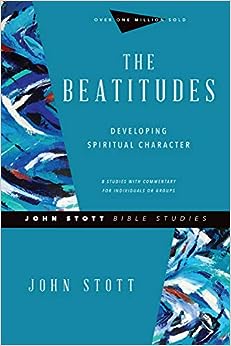Tonight we will be exploring the fourth Beatitude: Blessed are those that hunger and thirst for justice, for they shall be satisfied. Please review the discussion questions presented by John Stott in his book: The Beatitudes – Developing Spiritual Character. I have attached for your review the commentary on this Beatitude from both St. Gregory of Nyssa and Martin Luther. If you have time today, please read through these short commentaries.
Drawing on the word “hunger” Gregory looks at the hunger of Jesus in the desert in the Temptation narrative in Matthew 4 and immediately following his conversation with the Samaritan woman in John 4. For Gregory, therefore, justice is that which can satisfy our hunger. In the desert, Satan tempts Jesus by challenging him to change stones into bread. Gregory sees Satan tempting Jesus, as he does us, to seek fulfillment in that which cannot be fulfilling. Just as stones cannot satisfy hunger, so also can our passions and desires for the things of this world not satisfy the demands of justice. In John’s gospel, the disciples urge Jesus to eat something. He replies that his “food is to do the will of him who sent me.” Therefore, our hunger, like Jesus’, is satisfied by doing the Divine Will which Gregory will equate with the seven virtues (justice being one of the seven).
Whereas Gregory is more philosophical in his interpretation, Luther is pastoral. In most of his writing, Luther always seeks to answer the question of “What does this matter to me?” Luther gives very practical instruction on what it means to hunger for righteousness. As you may have also read in Bailey and Heschel, Luther says that righteousness isn’t an inward righteousness of becoming “pious and acceptable before God.” Rather Jesus is speaking of “outward righteousness which we observe among ourselves towards others.” For “he is a really blessed man who perseveringly and assiduously strives to promote the general welfare and the right conduct of everyone, and who helps to maintain and carry this out with word and deed, with counsel and with act.” In other words, whatever our calling (vocation) is, we must use it for the general welfare of all. Most importantly, Luther counsels us to never despair of being outwardly righteous even when our kindness is repaid with ingratitude and contempt. We cannot allow ourselves to be “frightened off or dumbfounded or be overcome by the ingratitude or malice of the world, but should always push along and persevere as much as possible.” And our satisfaction will come when we see that we have not labored in vain.
Dinner is at 6. The menu is halupki. Discussion about 6:45. Hope to see you here and please bring a friend.
God takes his stand in the council of heaven; *
Psalm 82:1-4
he gives judgment in the midst of the gods:
“How long will you judge unjustly, *
and show favor to the wicked?
Save the weak and the orphan; *
defend the humble and needy;
Rescue the weak and the poor; *
deliver them from the power of the wicked.

